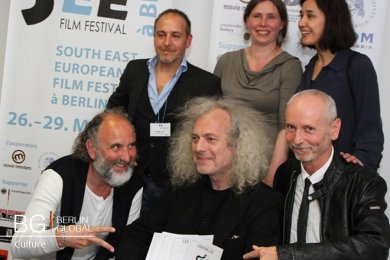The Balkans on Screen
Macedonian Film “Three Days in September” Wins Prestigious Festival Award
June 14th, 2016For the second time since its introduction in Paris in 2011, Festival Director Harald Siebler and Festival President Jordan Plevnes are bringing back the South East European Film Festival (SEEFF) to Berlin with 16 film productions out of 15 countries from the Balkan Peninsula, including Hungary, Slovenia and Moldova. Out of 1000 submitted movies, the festival board selected 16 movies, which were shown in the Zeughaus cinema in the Historical Museum and Humboldt University from the 26 to the 29th of May.
Nicholas Bouvier´s prophetic book “The Way of the World” with his wonderful sentence “The Balkans is the heart of Europe” has become the basis of the idea that every year twelve countries in this region present jointly a poetical insight of the reality and society of their country.
Initiated by the European Film Theatre and Dance Academy Skopje-Paris-Essen-Rotterdam two decades after the bloody wars on the territory of former Yugoslavia, the festival has become an important platform where cultural and spiritual bridges to the future could and can be built.
Bosnian director Ines Tanović is attempting to build such a bridge by reflecting on Bosnian culture with her film “Our everyday life – naša svakodnevna priča”. The plot focuses on the hardships and tribulations experienced by a Bosnian middle class family. After the father Muhamed loses his cherished company to the stock market, tension gradually builds up between him and his wife Marija. His son Saša, who moved back home after his army service, does not make life easier for him. Saša develops a negligent attitude towards family and work, which gets him into severe confrontations with his father.
After his mother becomes diagnosed with cancer, the family unit is threatened and previous family tensions diminish. Family ties loosen and grow strong again in cycles though the mother-son relationship remains strong. This film challenges notions of individual willpower and compromise, individualistic and shared social values and match them together with family expectations. These concepts imbalances each character in the film and makes them find a common ground. However, despite the anger and hardships, protagonist Saša eventually realizes that family is the fundamental core value and thereby returns to the family setting, which is an integral component of Bosnian culture.
While Tanović uses family as a returning point in their family drama, Cipranić however uses it as a valuable starting point to build up intrigues in his Serbian movie “Legacy – Amanet”. A pregnant girl appears, who falls in love with Todor and starts to deceive and manipulate the rest of the family members. As well, she begins to threaten the relationship between the mother and son. Her intentions appear good at first, but hide vindictive motives driven by her past relationship with Todor´s ex-father.
This psycho thriller reflects on half-broken family structures and corruptive individuals struggling at the bottom of society seeking revenge and retribution on individuals they despise. As Serbian director Nemanja Cipranić states, ironically, these individuals eventually become the same people they initially disliked. He further adds that this dichotomy can be seen as a critique on societal and interpersonal structures such as corruption in our country.
The SEE film festival focuses on a region where Europe and its ideals are constantly questioned and in discussion. Film productions coming from a culturally diverse region as the Balkans need to be presented and continuously screened to reflect the distinct living conditions and life values in Europe. The medium film paves the way to promote and sustain inter-cultural dialogue between nations, countries and religions. It allows for intercultural understanding without prejudices and half-truths that give countries, people, and artists a voice on different aspects of life”, says Harald Siebler while reflecting on the entire festival.
The winning thriller “Three Days in September – Tri Dena vo Septemvri”, by Darijan Pejovski deals with the implications of domestic and sexual violence. The film focuses on Marika and Jana; Marika is running from her past whereas Jana is on the way to confronting hers. As the movie unfolds, the viewer learns that Marika is a murderer on the run and Jana is on a mission to extract revenge. In midst of their despair, they realize they cannot escape their past. In this slick, assured feature debut, secrets unspool in a classic Hitchcockian fashion, which breaks from Macedonian film tradition featuring a universal story independent from its original setting.
Emir Hadžihafizbegović, one of the most renowned Bosnian actors was chosen best actor in “Our Everyday Life”. The International Young Jury chose the Albanian movie “Bota” by Iris Elezi and Thomas Logoreci as the best movie at the festival.
References:
News from Berlin
Vanja Lukenic, Cristina Stoica & Valentina de Gregorio, Berlin Global


